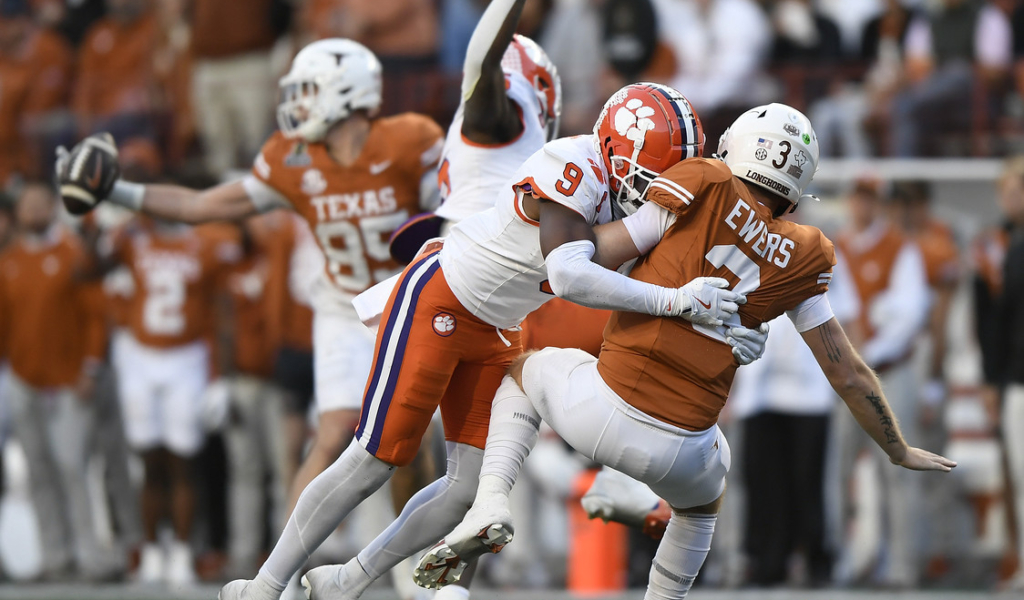CLEMSON — It has been 10 days since colleges officially started paying college athletes for their services.
As a part of the House settlement, NCAA Division I athletic departments are to share $20.5 million with their athletes. However, each school can allocate that money however they choose best.
Since football generates most of the dollars, schools like Clemson will allocate a large portion of its revenue to the football program. It seems like a fair situation for everyone, right?
Not so fast.
Colorado head coach Deion Sanders says one is not the same when it comes to paying college athletes. Though Sanders has built his Colorado program through the transfer portal and has been boastful in helping players get paid through name, image and likeness, he feels college football desperately needs to find a better way to limit what has been going on.
Sanders’ solution – create a salary cap.
“I wish there was a cap,” Sanders said at Big 12 Media Days earlier this week. “The top-of-the-line player makes this, and if you’re not that type of guy, you know you’re not going to make that. That’s what the NFL does.
“So, the problem is, you got a guy that’s not that darn good, but he could go to another school, and they give him a half million dollars and you can’t compete with that. And it doesn’t make sense.”
Sanders feels a salary cap will protect those teams that spend money and resources on developing players then watch them leave for a program that has more money to spend. The Pro Football Hall of Famer sighted SEC and Big Ten schools with the biggest advantages due to their hefty television deals, plus large alumni bases.
“All you have to do is look at the playoffs and what those teams spend, and you understand darn near why they’re in the playoffs,” he said. “It’s kind of hard to compete with somebody who’s giving $25 to $30 million to a freshman class. It’s crazy.
“The team that pays the most is going to win.”
Maybe the news on Thursday will help with some of Sanders’ concerns, as the College Sports Commission (CSC) issued guidance on NIL deals, indicating a stricter stance on arrangements involving collectives and a focus on “valid business purpose.”
The CSC’s announcement represents a tightening of NIL regulations and emphasizes a stricter interpretation for third-party deals.
The CSC sent a letter to Division I athletic directors, stating that the CSC had rejected deals between players and donor-backed collectives formed to give money to athletes or their schools. These arrangements lacked a “valid business purpose” and did not follow the rules requiring NIL deals to be with companies providing goods or services to the general public for profit.
The commission clarified that a legitimate commercial rationale beyond simply paying athletes is needed for a deal to be approved. For instance, a collective creating an event and charging admission to raise money for athletes isn’t considered a valid business purpose because it’s not providing goods or services to the general public for profit.
However, the CSC stated that collectives may act as marketing agencies that connect student-athletes with businesses that have a valid business purpose for using an athlete’s NIL to promote their business.
As part of the House settlement, a clearinghouse was established (NIL Go), which must approve third-party deals exceeding $600 based on “valid business purpose” and fair market value.
The move by the CSC could significantly impact or even lead to the shutdown of some existing collectives. These collectives were primarily focused on funneling money to athletes without a clear business purpose.
Some collectives have already announced their closure or are exploring new models, such as partnering with marketing agencies or businesses with legitimate commercial needs.
Also on Thursday, a bipartisan group of lawmakers from the U.S. House of Representatives announced they have introduced a bill to establish a set of national rules for college sports.
Who knows, but maybe Sanders will get his wish after all.
